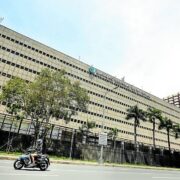Flood control, pork barrel, and an inflation of public trust

From unfinished and drawn-out road reconstruction projects to our politicians’ obscene wealth, corruption at all levels of government has always dangled in the face of every Filipino. But like an open secret you can’t prove—without knowledge of its exact scale and the possession of irrefutable evidence—corruption has been allowed to exist without recourse, and public trust, slowly eroding under the guise of misplaced resilience.
Through the ongoing flood control scandal, a fraction of the theft that is known to occur within the government has finally been given definitive proof, along with faces and names to which we can attribute the theft of billions of pesos.
But in light of a pork barrel scandal acquittal and our government system’s inclination to slow justice, what happens next?
Slow working justice and public trust
Ranked 114th out of 180 countries in watchdog’s 2024 Corruption Perceptions Index (CPI), the Philippine government doesn’t exactly have the most stellar of reputations. The ongoing scandal has further stained its reputation for the general public, so much so that the current government has been scrambling to regain the public trust it has lost.
“We will continue to cleanse the ranks of government to ensure that every official and every public servant is worthy of the trust placed in them by the people,” said President Ferdinand Marcos Jr., during the awarding ceremony for the 2025 Metrobank Foundation Outstanding Filipinos’ Medallion of Excellence award.
President Marcos also said during a speech in Malacañang, “We must take responsibility to eradicate this abhorrent culture of corruption that poisons public trust and robs us of a better future.”
But in that same breath, former Senate President Juan Ponce Enrile was acquitted of the 15 graft charges connecting him to the pork barrel scandal. He was accused of pocketing P172.8 million in kickbacks. Meanwhile, his former chief of staff Jessica Lucila “Gigi” Reyes and Janet Lim Napoles were also acquitted of their respective graft charges. Napoles, however, is still serving her sentence for a plunder conviction.
Sandiganbayan noted that the prosecution failed to provide clear-cut evidence that Enrile received kickbacks from the nongovernmental organizations linked to Napoles.
Meanwhile, probes into the billion-peso flood control scandal haven’t yielded any significant arrests—barring official charges against eight major contractors. And even if the Discayas and Cos, as well as any Senator or Congressman, were to be found guilty of their involvement in irregular flood control projects, who’s to say they would even be brought to justice?
Keep in mind, Ramon “Bong” Revilla Jr. and Jinggoy Estrada, who were charged for plunder and multiple counts of graft alongside Enrile and Napoles, were granted bail (plunder is supposedly a non-bailable offense) and allowed to resolve their cases as free men. Adding salt to the wound, both were again elected to the Senate.
If it’s not our corrupt systems, it’s our short-term memory that’s become the largest source of our frustration and disappointment.
Again, again, and again
Funnily enough, a game among all things—called “Far Cry 3,” to be specific—best describes the uniquely Filipino experience: “Insanity is doing the exact same thing over and over again, expecting to see some kind of change.”
Corruption and impunity have gotten so ingrained into Philippine culture that being caught is no longer enough. In just a few years—if they are even convicted—their cases will be dropped, and they’ll be back to living off millions of pesos of ill-gotten wealth.
A faulty system that protects the interests of the corrupt few at the expense of the greater public will yield results benefiting the former. To expect anything else is plain idiocy. Should the flood control scandal result in some form of justice, so be it. But until then, public trust means nothing. So what?





















